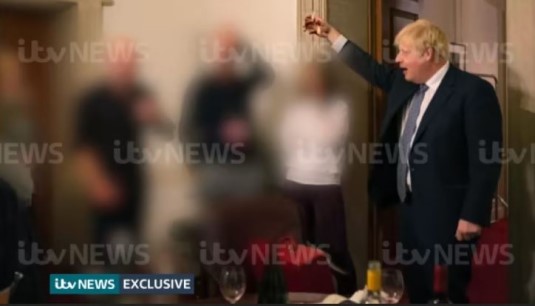
When the heat was really on Johnson back in January, he called in the Met so his egregious wrongdoing could, for a couple of months, be hidden behind the veil of "we can't comment while there's an ongoing police investigation." It was a high risk strategy, because everyone could read the reports in the papers and knew Johnson had very obviously trashed the regulations he expected the rest of us to live by. Getting a fine would, conventional wisdom suggested, force him to step down in disgrace. The months went by and when the notice was finally issued, Johnson muttered a non-apology in the Commons and that was the end of it. No resignation was forthcoming because there was no to force the resignation. Rebellion-minded Tory MPs had had their chance and they blew it in January. Another opportunity was passed up by the rapidly diminishing chancellor in April.
What Johnson did was play for time. His cunning calculated that the longer PartyGate could be dragged out, the more it would become background noise. Meanwhile the Tories would show how serious they were by concentrating on Vladimir Putin's invasion of Ukraine and (allegedly) tackling the rising cost of living. The fact he denied there were parties in Downing Street when he actually attended them wouldn't register up against the really weighty issues of the day and on he would carry. And so on PartyGate has rumbled on without causing Johnson too much bother since. Indeed, he and his new, apparently "tighter" Downing Street coterie would have anticipated the publication of his party snaps, And it doesn't change a thing. When he gets asked about this at Prime Minister's Questions, when some hapless minister is selected to do the rounds of breakfast television, the line will be that an apology has already been issued and the police were satisfied all the other gatherings were within the rules. If asked about the discrepancy between junior staff forced to cough up and Johnson getting away with a single fine, this will get batted away as a "matter for them". And lastly the old line about getting on with the priorities of the British people is about to get its umpteenth airing.
The danger, however, hasn't entirely passed for Johnson. The different political circumstances in Scotland means the Tory leader there gets to say out loud what a layer of Tory MPs are thinking. And so Douglas Ross has ostentatiously condemned the images. But he's not about to put his no confidence letter back into the 1922 Committee, and neither are they. Nor is there going to be a stalking horse leadership challenge: William Hague scrapped them in 1998 in case Michael Portillo re-entered parliament and came gunning for his post. It's to Johnson's preternatural luck that the danger he's in is tempered by the constitutional cowardice of his MPs. With no obvious alternative waiting in the wings, it's also a case of them sticking with the devil they know.
But there are other dangers too, dangers older, wiser Tories used to be alert to. Liberal democracy in this country acts as a political outlet, a means of peacefully channelling the interests (and frustrations) of the classes and strata of British society. Its legitimacy is imperilled if the system isn't seen to be working. After the Brexit referendum, the polarisation of politics reversed, to some extent, the idea the political parties were all the same. Before then low turn out and low interest was the norm. With Johnson's appalling behaviour, the lack of accountability and absence of contrition is less a moment of despondency and more a politicisation event, particularly among those who lost people and were prevented from seeing them by Covid restrictions. For many of these it won't be that they hold Johnson and his party in contempt, but the danger is it spreads to all forms of constitutional politics with who-knows-what consequences. Even worse for official society, because Johnson dragged the Met into the fray as his police shield of convenience, their failure to issue more fines despite photographic evidence of his rule-breaking sees the legitimacy of the force decline further. Not among those they police on the streets of London whose opinions don't count, but those middle class and some upper echelons of the establishment the Met does need to have onside.
Before this, the Tories were already in a bad way, but Johnson's lies and antics these past months threaten to spread discontent with the Conservative Party to the institutions of the state itself. If that doesn't give more intelligent Tories pause for reflection and cause for action, nothing will.
Image Credit
2 comments:
As a Labour supporter, who’s the Conservative leader you’d like most like Starmer to confront at the next election, and who’s the one you’d least like?
Good question. Assuming Johnson goes, Liz Truss or one of the similarly crazed rightwingers would be easiest for Starmer to beat. Much harder would be someone who's a bit of an unknown and so can act as someone the 2019 Tory voter coalition can project their hopes and aspirations onto - people like Mordaunt, Mercer, and Tugendhat.
Post a Comment